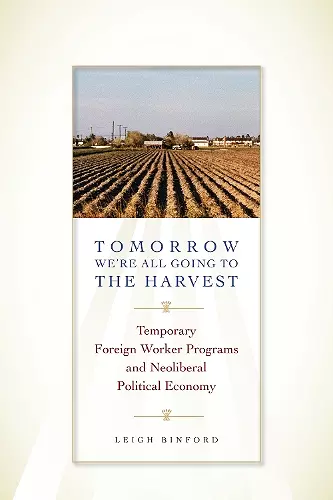Tomorrow We're All Going to the Harvest
Temporary Foreign Worker Programs and Neoliberal Political Economy
Format:Paperback
Publisher:University of Texas Press
Published:1st Jan '13
Should be back in stock very soon

"There is no study of these programs that even comes close to Binford's book in terms of the amazing level of research... It is well written, compelling and richly told, and above all it is really model scholarship... This is not simply the best book on temporary foreign worker programs, but it speaks to larger issues of immigration, agriculture, and neoliberalism." -- Steve Striffler, Doris Zemurray Stone Chair in Latin American Studies and Professor of Anthropology and Geography, University of New Orleans "Fresh information... A clear and highly readable argument [that] does a good job of covering virtually all the issues surrounding guest worker programs. Readers of this work will be impressed not only with this breadth but with the human detail Binford dons on each of these issues, giving them flesh and blood." -- David Griffith, Professor of Anthropology and Senior Scientist, Institute for Coastal Science and Policy, East Carolina University
This exceptional study examines the experience of Mexican workers in the Canadian Seasonal Agricultural Worker Program (SAWP), widely considered a model program by the World Bank and other international institutions despite the significant violations of l
From its inception in 1966, the Canadian Seasonal Agricultural Worker Program (SAWP) has grown to employ approximately 20,000 workers annually, the majority from Mexico. The program has been hailed as a model that alleviates human rights concerns because, under contract, SAWP workers travel legally, receive health benefits, contribute to pensions, are represented by Canadian consular officials, and rate the program favorably. Tomorrow We’re All Going to the Harvest takes us behind the ideology and examines the daily lives of SAWP workers from Tlaxcala, Mexico (one of the leading sending states), observing the great personal and family price paid in order to experience a temporary rise in a standard of living. The book also observes the disparities of a gutted Mexican countryside versus the flourishing agriculture in Canada, where farm labor demand remains high.
Drawn from extensive surveys and nearly two hundred interviews, ethnographic work in Ontario (destination of over 77 percent of migrants in the author’s sample), and quantitative data, this is much more than a case study; it situates the Tlaxcala-Canada exchange within the broader issues of migration, economics, and cultural currents. Bringing to light the historical genesis of “complementary” labor markets and the contradictory positioning of Mexican government representatives, Leigh Binford also explores the language barriers and nonexistent worker networks in Canada, as well as the physical realities of the work itself, making this book a complete portrait of a provocative segment of migrant labor.
Binford has written an impressive and compelling book on the Canadian SAWP. The critical examination of this highly regarded program is timely as governments and industries argue for programs of their own without consideration of the human costs involved. For anthropologists entering into the fray of globalization and the consequences of neoliberal policies, this book makes a welcome contribution. * American Anthropologist *
ISBN: 9780292756885
Dimensions: 229mm x 152mm x 18mm
Weight: 367g
299 pages